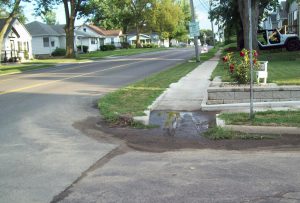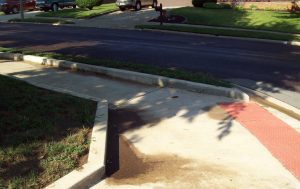Lawsuit challenges Pekin on ADA violations
By Tim Alexander For Chronicle Media — December 26, 2018
Two of the three curb ramps that were constructed because of an earlier complaint filed against the city of Pekin are at the corner of Alhambra Court and Granada Drive and at the corner of Alhambra Court and Sierra Drive. This photo as taken in July 2017. (Photo courtesy of Carl Reardon)
Broken, cracked and crumbling sidewalks, along with handicap-accessible challenges such as hazardous crossroads and the “pervasive existence of numerous architectural and other physical barriers,” are at the heart of a new lawsuit brought against the city of Pekin and its top officials.
Filed by attorney Carl Reardon of East Peoria and the Chicago-based law firm Robbins, Saloman and Patt, the suit alleges the city failed to make public infrastructure improvements to public rights-of-way despite receiving more than $6.5 million in federal funds over the past 15 years, after a 20-year transition plan announced in 1995 to install curb ramps at almost 900 locations was never completed.
The suit was filed electronically on Wednesday, Dec. 5, when the U.S. District Court in Peoria was closed for a day of national mourning following the death of former U.S. President George H.W. Bush.
The symbolic gesture of filing the lawsuit on that day was not lost on Reardon, who has been practicing law in the Peoria area for 54 years.
“President George Herbert Walker Bush signed the Americans with Disabilities Act (ADA) into law (in 1990),” Reardon told the Chronicle. “The city simply has not taken care of their sidewalks and ramps, and has not done the work that they were required to do. The city of Pekin totally and completely dismissed the recommendations made by the Federal Highway Administration in fulfilling the minimum ADA requirements.”
According to the attorney, handicapped and wheelchair-bound citizens are being discriminated against because hazardous crossroads, broken sidewalks and physical barriers are impeding them from being able to move about the city in a safe manner.
Less than 200 of the city’s nearly 1,500 sidewalks have compliant curb ramps, according to the court filing.
“People in wheelchairs can’t even go up and down the sidewalks because of the blockages. They must get off the sidewalk and travel down the streets, and that is illegal and dangerous. They either have to stay home in their houses or break the law,” said Reardon.
The city of Pekin has 60 days to respond to the suit’s charges, and has reportedly hired attorneys to prepare a response to the charges.
Pekin city officials have not responded to media inquiries for comment on the latest class-action case, which was brought in the name of seven individuals, one of which is a minor whose name was redacted from the published court filing.
Seven narratives, describing instances of discrimination the individuals have encountered, are included in the filing.

The recent lawsuit cites the 14th Street sidewalk improvement constructed with HUD funds is not preventing gathering of water at the corner. This photo was taken in July 2018. (Photo courtesy of Carl Reardon)
The lawsuit seeks to force the city to make the required repairs to sidewalks and curb ramps to make them more accessible to people with disabilities and bring the city into compliance with the ADA.
The action represents just one of three active lawsuits against the city of Pekin — which is the Tazewell County seat and center of local government — regarding the ADA.
In 2011, Pekin resident and later city council member Tim Golden filed a suit against the city alleging officials never followed through on their “transition plan” and voluntary compliance agreement to bring the city’s sidewalks and curb ramps up to code.
According to Golden’s lawsuit, the city is “not truly concerned” with meeting minimum federal or state technical scoping requirements for sidewalks and curb ramps.
“(Golden) tried to get the city to make repairs in his neighborhood, and they refused. He turned them into the feds in 2012, but they didn’t do anything until 2014, when they invited him to file a new complaint against the city. In 2016, they did an investigation of the city and found that the city was not in compliance at that time,” said Reardon.
“The city then entered into a consent decree with the feds that it would do the necessary work. The consent decree gave us the right to sue, and as a result, we filed suit. Tim Golden filed this as a good citizen who is aware of the ADA. He has since filed another lawsuit against the city for the (alleged) retaliation they brought against him and his son.”
Golden’s lawsuit alleges the city used inferior and illegal building materials to construct curb ramps near his home on Alhambra Court. Two felony charges were subsequently brought against Golden’s son, Ken Golden, for removing building materials from the site. Those charges are still pending.
New to this case is a transmission Reardon received on Dec. 13 from the office of U.S. Sen. Tammy Duckworth.
“It stated that the feds’ newest investigation has been completed. The committee met (Dec. 13) and has made a decision (on the Golden lawsuit) and we will know their decision immediately after the first of the year,” he said. “All three of these cases have yet to be resolved. We are getting ready for a trial in the case of Ken Golden, and we have a massive amount of evidence to present. I am confident he will be found not guilty.”







